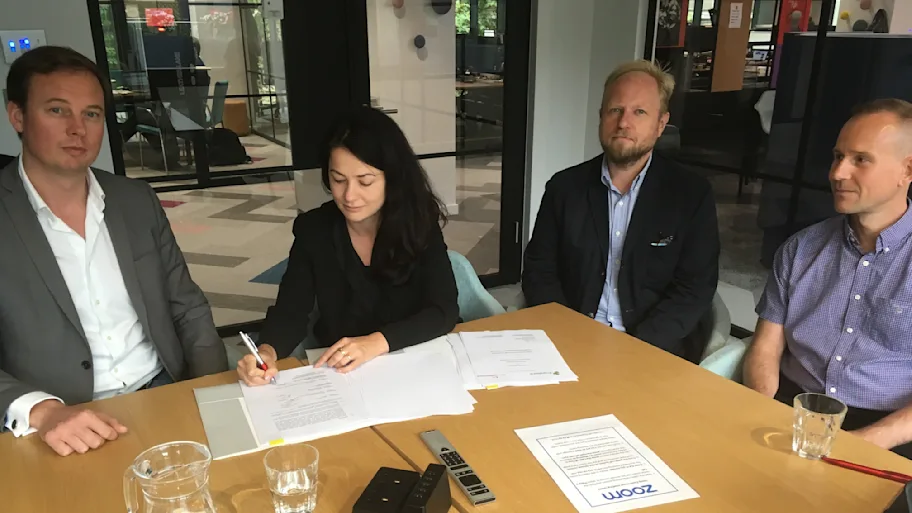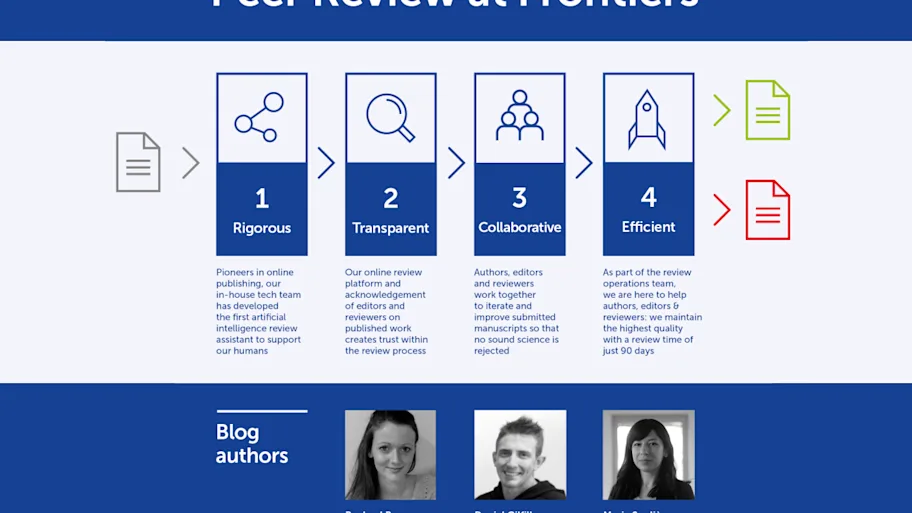
- Science news
- Frontiers news
- Publishing with Frontiers: A look behind the scenes!
Publishing with Frontiers: A look behind the scenes!
Author: Anna Mazzon, senior review operations specialist

For the last three years I have worked in Frontiers’ Review Operations team. I have seen the company grow significantly and incorporate important structural changes, which enabled a successful scale-up, combined with a consistent focus on maintaining our rigorous quality standards.
I have a clear understanding of the different teams that make up the publishing department, and of the ways they interact and divide responsibilities, all driven by the same common goal: bringing the best science to the world, as soon as possible.
However, I have noticed that very understandably our editors and authors like to know more about the structure of our publishing department, because they tend to have multiple interactions with different teams and people. With this blog post, I thought it might be helpful to offer readers a bird’s-eye view of the main teams composing our publishing wing, primarily to empower them during their interactions with us, but also to showcase what is in my opinion a beautiful example of business synergy and inter-team collaboration.
To keep things simple, we could say that the constitution of our publishing department mirrors the life cycle of a manuscript: there is a publishing section that takes care of the pre-publication aspects (such as commissioning article collections or building editorial boards), another one that is directly involved in the peer review process, and one that handles all the post-acceptance matters. Each one offers a different skill-set, area of expertise, and has specific responsibilities, all the while working together to help accomplish our mission, making all science open.
To delve into the details of how our publishing sector operates, I decided to use a metaphor; I believe that metaphors have a great imaginative power and are great tools to make an abstract subject more relatable and engaging. Odd as it may seem, I would like to propose an analogy between publishing and farming. What are the necessary steps to create a prosperous crop farming, and how does this resemble what we do at Frontiers?
Planning and preparation stage
Long before they start planting, farmers must choose the best location for their farm, collect all the necessary tools and seeds, and ensure they are respecting the seasonal cycles. Metaphorically, this is precisely what our Launch Specialists do, as they build solid foundations for all that is to come. This team is in fact responsible for launching impactful journals and sections (within existing journals) in the most important fields of research. They also help to start building editorial boards made of worldwide experts in the field. It is thanks to their preliminary work that new journals and sections are set up for immediate and long-term success.
Seeding stage
Once everything has been carefully planned and the soil is ready, it is time to plant the seeds. This is the task of our Journal Specialists, who work tirelessly to create top-notch article collections (or as we call them at Frontiers, “Research Topics”) around hot topics, which in turn attract high-quality content to our journals. Research Topics broaden our knowledge on a specific theme, discuss novel aspects, and ultimately influence future research and practice. The Journal Team is also in charge of growing and keeping our editorial boards engaged; and it is the editors who give our journals strategic directions, help them grow and build a solid reputation.
Maintenance stage
To produce a healthy and fruitful crop, one must constantly water the seeds, apply fertilizers, and protect the crop from animals or storms.
I think that the Review Operations Specialists have a very similar function, since they are directly responsible for managing our submissions and ensuring that they all go through a timely, fair, and efficient peer-review process. This is possible thanks to rigorous editorial policies and peer-review guidelines for editors, reviewers, and authors. This team plays a pivotal role in the publishing department, as it is responsible for maintaining the delicate balance between upholding the highest possible levels of academic research and moving manuscripts through the pipeline in a swift fashion.
Remove the weeds
Farmers must pay constant attention to their crop and pull out the weeds that are threatening the life of the plants.
There are some parallels between this process, and the role played by our Research Integrity Specialists, helped by our Artificial Intelligence Review Assistance (AIRA). They check all submitted manuscripts and perform numerous initial checks to make sure they are ready to enter the peer review stage. This team adopts the highest quality and ethical criteria to accept articles and prevents the publication of any manuscripts that are below our standards.
Harvesting stage
Farmers only have a small window of time to harvest the fruits of their labor, and they must do so efficiently. This is our Production Specialists’ remit: make sure that the manuscripts that have been reviewed and accepted go through a smooth and timely production and copyediting phase. Additionally, the Production team also ensures that papers are deposited in relevant depositories, handles eBook and abstract book production. After the production phase, our articles become available to our readers, and start making a real impact in the world.
I hope this explains why you may have interacted for example with a Journal Specialists, a Review Operations Specialists, and a Production Specialist. I also hope this shed some clarity on how we work together to give our customers the best possible experience, while working hard on our dream to make open science a reality for all.
My Bio
My name is Anna, and I am a Senior Specialist in the Review Operations Team, based in Switzerland. I am genuinely committed to our mission, and I am so proud of being part of such a dynamic and forward-thinking company. Outside working hours, I am passionate about yoga, all things sustainability, creative writing, and I love spending time in nature.






